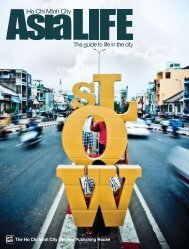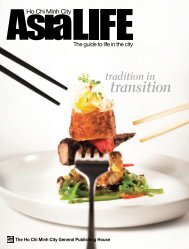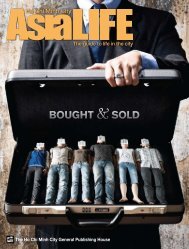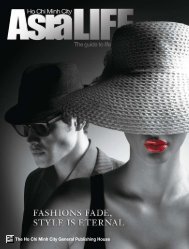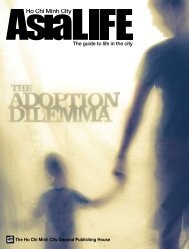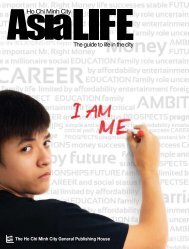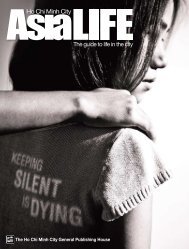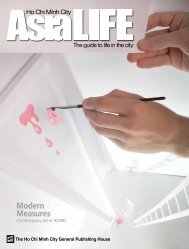Grace Lewis - AsiaLIFE Magazine
Grace Lewis - AsiaLIFE Magazine
Grace Lewis - AsiaLIFE Magazine
Create successful ePaper yourself
Turn your PDF publications into a flip-book with our unique Google optimized e-Paper software.
A Professional’s Recommendations<br />
house so neighbours could see what was<br />
happening inside.<br />
Grey Group Associate Creative Director<br />
Rajib Gupta said they tried to communicate<br />
the message that if it was not alright to<br />
engage in this behaviour in public, then why<br />
think it is OK at home.<br />
“We tried to find something different, and<br />
a big issue in Asian countries particularly is<br />
loss of face. People may not see you but<br />
if a woman goes out in public with bruises<br />
on her face, people know where they came<br />
from. It is not her that is losing face, it is<br />
you.”<br />
The United Nations Office on Drugs and<br />
Crime also conducts awareness raising<br />
campaigns in the community. These efforts<br />
include assisting to produce a national TV<br />
series on domestic violence called Breaking<br />
the Silence, and holding a writing competition<br />
for members of the news media to<br />
encourage more reporting on the issue.<br />
“The review committee judging the competition<br />
was overwhelmed by the response<br />
with over 1000 entries received,” UNODC<br />
Country Manager Zhuldyz Akisheva said.<br />
The UNODC has also been working on<br />
training local law enforcement officers to<br />
better equip them to respond to domestic<br />
violence cases. Akisheva said the agency<br />
had worked with 186 police officers since<br />
2008 in ‘Train the Trainer’ sessions.<br />
“The aim is to create a pool of trained,<br />
competent law enforcement officers who<br />
can in turn train their peers,” she said.<br />
“Our experience is they don’t know how<br />
to apply the law, identify if it is an administrative<br />
or criminal offence, gather evidence or<br />
talk to the victims.”<br />
Akisheva said the general mindset of<br />
police was that domestic violence was not a<br />
public issue but rather a family issue.<br />
Nguyet of the Women’s Union was of a<br />
different opinion. “If you are suffering violence,<br />
you need to fight against it, not keep<br />
quiet like the old days.<br />
“We need to show the men that they can’t<br />
beat their wives. It’s not their right.”<br />
Martin Donnelly is a practising counsellor<br />
with more than 20 years experience. He has<br />
worked with both victims and perpetrators of<br />
domestic violence in the United States.<br />
Though he has only lived in HCM City for<br />
a year, he believes that the general attitude<br />
towards domestic violence is similar to that<br />
held in the US about 60 years ago.<br />
“It was very much accepted that it was OK<br />
for a man to hit his wife,” he said. “It wasn’t<br />
seen as abuse.<br />
“I’m pretty sure that something similar is<br />
operating in Vietnam. From what I’ve seen<br />
there is a very strong sense of male privilege<br />
here.”<br />
In Donnelly’s opinion, for real change to<br />
occur this attitude needs to shift. And to really<br />
effect change, boys and men need to be<br />
educated.<br />
This is especially important since last year’s<br />
National Study on Domestic Violence Against<br />
Women in Vietnam found that boys who<br />
saw their fathers abuse their mothers were<br />
far more likely to beat their own partners in<br />
adulthood.<br />
Donnelly believes young men need to be<br />
taught how to control their responses. They<br />
need to learn to recognise when they’re<br />
about to lose it and walk away before it’s too<br />
late.<br />
To really curb domestic violence, though,<br />
he suggests using the media. While the<br />
government has teamed with various NGOs<br />
and creative agencies to develop advertising<br />
campaigns and even a 10-episode television<br />
show aired in 2009 called Breaking the<br />
Silence, Donnelly suggests a more long-term<br />
approach.<br />
He cites one example that has worked<br />
well in South Africa—the long-running and<br />
very popular soap opera Soul City, which<br />
broaches deeply sensitive social issues like<br />
HIV and AIDS in a dramatic yet entertaining<br />
fashion.<br />
“That’s where I’d put my money,” Donnelly<br />
said, “in producing a well-written soap opera<br />
with characters that viewers can relate to.<br />
"This is a problem that can only be addressed<br />
on a societal level and that’s where I would<br />
start."<br />
26 asialife HCMC asialife HCMC 27



